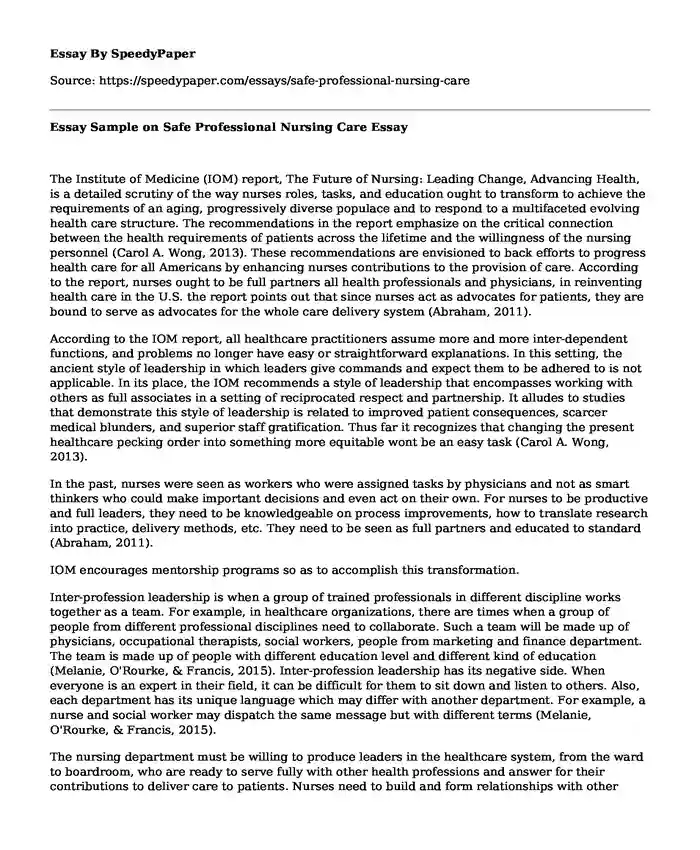
| Type of paper: | Essay |
| Categories: | Health and Social Care Nursing management Nursing care |
| Pages: | 3 |
| Wordcount: | 637 words |
The Institute of Medicine (IOM) report, The Future of Nursing: Leading Change, Advancing Health, is a detailed scrutiny of the way nurses roles, tasks, and education ought to transform to achieve the requirements of an aging, progressively diverse populace and to respond to a multifaceted evolving health care structure. The recommendations in the report emphasize on the critical connection between the health requirements of patients across the lifetime and the willingness of the nursing personnel (Carol A. Wong, 2013). These recommendations are envisioned to back efforts to progress health care for all Americans by enhancing nurses contributions to the provision of care. According to the report, nurses ought to be full partners all health professionals and physicians, in reinventing health care in the U.S. the report points out that since nurses act as advocates for patients, they are bound to serve as advocates for the whole care delivery system (Abraham, 2011).
According to the IOM report, all healthcare practitioners assume more and more inter-dependent functions, and problems no longer have easy or straightforward explanations. In this setting, the ancient style of leadership in which leaders give commands and expect them to be adhered to is not applicable. In its place, the IOM recommends a style of leadership that encompasses working with others as full associates in a setting of reciprocated respect and partnership. It alludes to studies that demonstrate this style of leadership is related to improved patient consequences, scarcer medical blunders, and superior staff gratification. Thus far it recognizes that changing the present healthcare pecking order into something more equitable wont be an easy task (Carol A. Wong, 2013).
In the past, nurses were seen as workers who were assigned tasks by physicians and not as smart thinkers who could make important decisions and even act on their own. For nurses to be productive and full leaders, they need to be knowledgeable on process improvements, how to translate research into practice, delivery methods, etc. They need to be seen as full partners and educated to standard (Abraham, 2011).
IOM encourages mentorship programs so as to accomplish this transformation.
Inter-profession leadership is when a group of trained professionals in different discipline works together as a team. For example, in healthcare organizations, there are times when a group of people from different professional disciplines need to collaborate. Such a team will be made up of physicians, occupational therapists, social workers, people from marketing and finance department. The team is made up of people with different education level and different kind of education (Melanie, O'Rourke, & Francis, 2015). Inter-profession leadership has its negative side. When everyone is an expert in their field, it can be difficult for them to sit down and listen to others. Also, each department has its unique language which may differ with another department. For example, a nurse and social worker may dispatch the same message but with different terms (Melanie, O'Rourke, & Francis, 2015).
The nursing department must be willing to produce leaders in the healthcare system, from the ward to boardroom, who are ready to serve fully with other health professions and answer for their contributions to deliver care to patients. Nurses need to build and form relationships with other health workers, business owners, social workers, humanitarian aid providers and the public to be able to have an impact in health leadership. They need to voice their opinions on health policy and decision making and also implement them along with other leaders (Abraham, 2011).
References
Abraham, P. J. (2011). Developing nurse leaders: a program enhancing staff nurse leadership skills and professionalism. Nursing Administration Quartely, 35(4), 306-312.
Carol A. Wong, G. G. (2013). The relationship between nursing leadership and patient outcomes: a systematic review update. Journal of nursing management, 21(5), 709-724.
Melanie, B., O'Rourke, M., & Francis, J. (2015). Improving Population Health through Interprofessional Leadership: The Case for a Professional Practice Model.
Cite this page
Essay Sample on Safe Professional Nursing Care. (2019, Oct 15). Retrieved from https://speedypaper.net/essays/safe-professional-nursing-care
Request Removal
If you are the original author of this essay and no longer wish to have it published on the SpeedyPaper website, please click below to request its removal:
- Free Essay on the Role Played by Livestock and Crops in the Spread of Germs
- Essay Example: Policy Making at Local and State Governments
- Free Paper on Choosing the Methodology
- Relationship of Citizenship Race and Immigration in the US
- Free Essay Dedicated to Public Policy Ethics
- Essay Sample on Emergency Department Ratio Analysis
- Design Thinking in Chronic Care Models in Nursing. Free Essay
Popular categories




